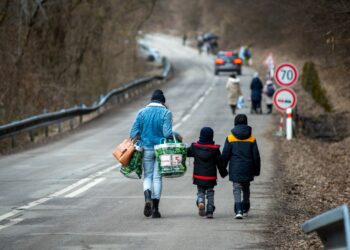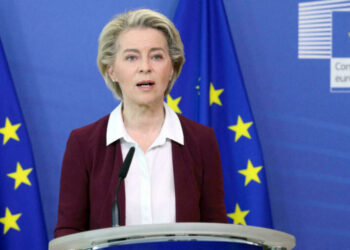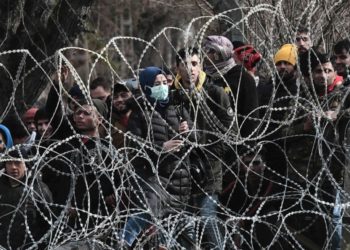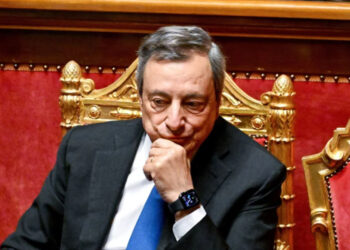The European People’s Party (EPP), a center-right party alliance traditionally dominated by Christian Democratic parties, finds itself at a crossroads. As the boundaries of the European Union have expanded eastward and traditional center-right parties like Italy’s Christian Democrats have lost influence, the EPP now includes members who are further to the right of the political spectrum.
Just how far to the right the EPP itself is willing to move is now in question. A recent suspension might give some insight. On March 20, the alliance voted by a margin of 190 to 3 to suspend the membership of Hungary’s ruling populist, right-wing party led by Prime Minister Viktor Orban.
#Fidesz will be suspended with immediate effect and until further notice following today’s vote of EPP members (190 in favour, 3 against). The suspension entails:
▪No attendance at any party meeting
▪No voting rights
▪No right to propose candidates for posts— Joseph Daul (@JosephDaul) March 20, 2019
The suspension will stay in place until a three-member evaluation committee determines if Fidesz conforms to EPP values and meets stipulations set forth by the EPP, including ending perceived anti-Brussels campaigns in Hungary. The report isn’t expected until after the European Parliament elections in late May.
The suspension was a compromise after 13 European member parties wrote to EPP President Joseph Daul in late February, requesting Fidesz be expelled. The trigger for the call was a poster campaign in Hungary suggesting that E.U. Commission President Jean-Claude Juncker, himself a member of the EPP, is supporting dangerous levels of migration and is a puppet of investor and philanthropist George Soros, who is vilified by Orban.
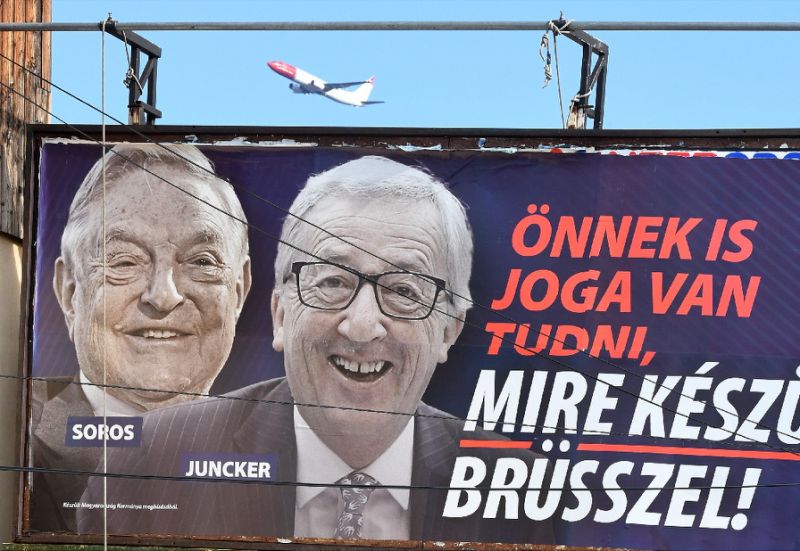
Orban’s nationalist, anti-immigration, and seemingly Eurosceptic comments have been a cause of discomfort for his EPP brethren and within the E.U. more widely. The increasingly populist policies of Fidesz in Hungary have led to claims of a weakening of the checks and balances required in a healthy democracy.
In September 2018, the European Parliament, including members of the EPP Group, called upon the Council of the European Union to determine whether Hungary should be sanctioned for contravening of Article 2 of the Treaty of the European Union, which states that the E.U. is founded on values such as democracy, equality, and the rule of law. The Council is yet to respond.
Orban claims that the Fidesz suspension was a joint decision and while the evaluation committee investigates, the focus is now on working with the EPP in the forthcoming European Parliament (EP) elections.
European Parliament
Within the EP, there are currently eight party groups roughly organized within the chamber according to their position on the political spectrum. A group must consist of at least 25 MEPs from a quarter of the member states. The more MEPs within a group, the larger its influence within the EP.
Some party groups exist only within the EP, but others belong to an overarching political party, such as the Progressive Alliance of Socialists and Democrats Group (S&D Group), which is affiliated with the Party of European Socialists (PES), and the European People’s Party Group (EPP Group) which is linked to the EPP.
While a government is not formed in the EP, there are incentives to belonging to a party group, such as access to key positions in the EP, the groups themselves, and within the EP’s committees, where the bulk of the Parliament’s work takes place.
European People’s Party and Fidesz
While Fidesz has been suspended from the EPP, the suspension has not extended to the EPP Group, which includes 11 Members of the European Parliament (MEPs) from Fidesz. Not suspending Fidesz from the EPP Group allows the Group to maintain all of its positions within the EP. Given the impending election and the lack of certainty as to the future of the EPP’s ongoing relationship with Fidesz, this decision is pragmatism at its finest.
In a lengthy interview following the announcement of the suspension, Orban stressed Fidesz’s unity with the EPP:
“… having the entire spectrum of the EPP is important. So, the more Liberal Northern members have their place, and the more conservative Christian member parties have their place as well. I think this is a good balance when it comes to the elections. I think after the elections… we will have to see how we are going to position ourselves.”
It is that positioning which will cause the most concern for the EPP. Orban acknowledged that the big question here is: what kind of coalition will the EPP propose after the elections? Will the alliance move to the left, and collaborate with liberals and greens, or try and find partners on the right? If the EPP wants to keep unity during the campaign, this question should not be raised, Orban claimed. Unsaid was that if Fidesz was not happy it could leave the EPP Group and either join one of the two right-wing party groups operating in the EP or form a new party group, thereby decreasing the power of the center-right.
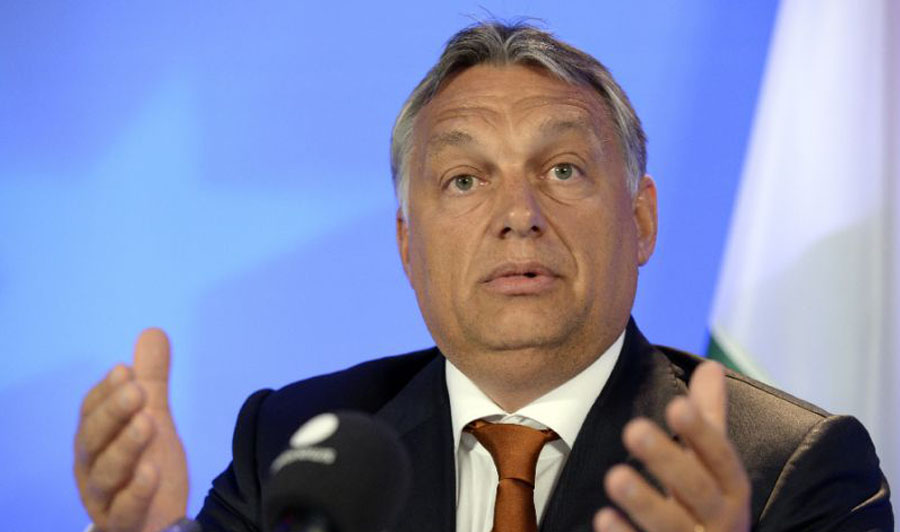
While Orban claims he wants to stay in the EPP and the EPP Group, it has been reported that his party has been in talks Europe of Nations and Freedom Group, a far-right group including members from Italy’s Lega Nord (Northern League), France’s Rassemblement National (formerly National Front), and the Austrian Freiheitliche Partei (Freedom Party). Fidesz also seems to be close to Poland’s Law and Justice Party, which currently sits in the European Conservatives and Reformists Group.
EP elections are generally considered second-order elections where voters use the election as an opportunity to voice opinions on their national government rather than on E.U. issues. Further muddying the waters, candidates run on tickets organized by their national parties rather than as representatives a party group. In that sense, except for the hyper-aware, most voters won’t be influenced by the EPP issue outside of Hungary.
2019 EP Elections: Size Matters
An aggregate of polls shows that despite a swing against it, the EPP Group will remain the largest following the European elections in May, with a projected 179 (out of 751) seats. Fidesz is on track to win 13 seats, representing 7 percent of the anticipated EPP Group seats.
It is assumed that for the first time, the center-left S&D Group and the EPP Group will account for less than 50 percent of the chamber, and thus any grand coalition required for key legislation will need to involve additional party groups. There is a sizable bloc of MEPs to the right of the EPP Group and the loss of Fidesz MEPs to the right would be a significant blow to the Group. A related concern is that without Fidesz, the appointment of the EPP’s candidate for the presidency of the E.U. Commission, Manfred Weber, could face difficulties.
The #EPP today accepted my proposal to suspend #Fidesz. This was a necessary decision. Our values are not negotiable. Now it is up to the evaluation committee to decide on the position of Fidesz in the @EPP, based on concrete progress on our concerns. They have to rebuild trust. pic.twitter.com/BVtFHCy8W1
— Manfred Weber (@ManfredWeber) March 20, 2019
Almost two months out from the EP elections and it seems likely that the far-right and center (Liberal Democrats) groups will experience the most significant gains, providing the EPP Group with a real choice of moving towards the center or the right when seeking to pass key legislation.
At that point, we will see how much the EPP and the EPP Group are prepared to sacrifice to keep Fidesz in the alliance and maintain the increasingly fragile accord between the center-right and right-wing parties operating within.
Disclaimer: The views and opinions expressed here are those of the author and do not necessarily reflect the editorial position of The Globe Post.



